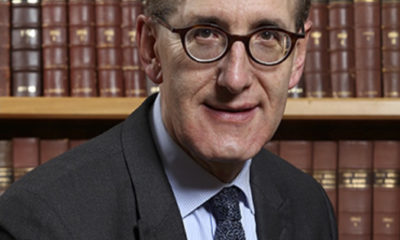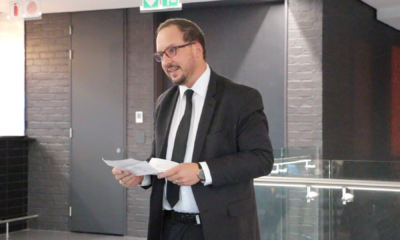
OpEds

Ukraine war – how did we get here?
With the unfolding human tragedy in Ukraine worsening every day and the civilian situation in some Ukrainian cities approaching absolute crisis status, it’s worth taking a step back and asking, how did we get to this point?
Amazingly, it seems to be mostly due to a series of miscalculations by Russian President Vladimir Putin. Putin, normally the master tactician and strategist, has made the following miscalculations:
First, it’s clear that Putin grossly underestimated the reaction from the West. Having got away with his previous Ukraine campaign in 2014 in which he annexed Crimea, he no doubt expected a similar response – strong condemnation and inefficient sanctions. This time, however, he has been faced by a West more united than at any time since World War II.
It took all of five days for Russia to become the most sanctioned country in the world. Sanctions that were being bitterly debated and faced much resistance, like cutting Nord Stream 2, a new pipeline supplying Russian gas to Germany that wasn’t yet on stream, were suddenly implemented overnight.
Putin no doubt has also underestimated United States President Joe Biden. Biden, although strenuously avoiding any direct military response from America or the North Atlantic Treaty Organisation (Nato), has been able to unite all Western countries in supporting sanctions. For once, there are no holdouts. Biden has gone a lot further than many expected. He hasn’t shied away from implementing tough sanctions, even at economic cost to the US. He’s also openly supplying arms to Ukraine and assisting other Nato countries in doing the same.
Second, Putin seems to have underestimated Ukraine. From the way the campaign started, it looks like he was expecting Ukraine to collapse quickly and the campaign to be short and quick. He didn’t expect such fierce resistance and has been surprised at how Ukrainians have united as a nation. From all accounts, he genuinely expected the war to be over within a week.
Third, Putin has overestimated his army. In spite of spending vast amounts in the past decade on equipment and modernising the army, it has still faced major logistical and equipment issues. In many cases, vehicles have run out of petrol and have even been forced to stop due to faulty tyres. In addition, the army hasn’t performed particularly well against a highly motivated adversary and has suffered heavy losses in manpower and equipment.
Fourth, Putin has been surprised by Europe. As many commentators have been being saying, in the space of two weeks, we are seeing a vastly different Europe. Germany has gone from supplying only helmets to Ukraine before the war and has started supplying anti-tank missiles and, for the first time, agreeing to increase its military spending to the 2% of gross domestic product that Nato requires.
Germany has dropped its pacifist, unwilling to get involved stance, and has now announced that its military is to be massively upgraded. The armed forces are to be brought up to speed with a special fund of €100 billion (R1.6 trillion).
Countries like Sweden and Finland are now openly discussing the prospect of joining Nato. The United Kingdom, long a source of oligarch money, has sanctioned the main oligarchs and pushed through the Economic Crime (Transparency and Enforcement) Bill in the House of Commons in a single day. The Bill will be used to clamp down on individuals already sanctioned by other Western countries.
Finally, Putin vastly underestimated the world’s reaction. After two years of COVID-19, the world is far more sensitive, involved and simply unwilling to accept an unprovoked invasion of a country by a far bigger and stronger neighbour. The number of businesses pulling out of Russia, from McDonald’s and Coke to IKEA, as well as the oil majors, has been swift and unprecedented. Russia is finding itself isolated and financially squeezed. While two major powers, China and India, have tried to remain neutral, they won’t risk being exposed to US sanctions themselves and are unlikely to assist Russia in circumventing sanctions in any meaningful way (apart from buying Russian oil at probably discounted rates). In any event, even if they continue buying Russian oil, they cannot on their own buy sufficient quantities to replace Western demand.
Apart from the tragic loss of life, humanitarian catastrophe and the absolute devastation of Ukrainian cities and civilian population, this war will have huge economic consequences. Not only is Russia the second-largest crude oil exporter behind Saudi Arabia, but together with Ukraine, is a major exporter of wheat, corn, barley and sunflower oil (the two exporting almost 80% of the world’s supply in the case of sunflower oil). Inflation around the world will rise sharply and there might be food shortages in many countries, especially the poorer ones which will struggle to find alternative supplies. It’s hoped that there will be no more miscalculations and a way is found to end this war quickly.
- Harry Joffe is a Johannesburg tax and trust attorney.











Rochelle Winer
March 21, 2022 at 3:02 pm
Excellent article very informative. Always enjoy reading Harry’s articles. Proud to call him my son in law.
Best wishes and thanks for a great Jewish newspaper. Makes me proud to be a SA Jew. Carry on the good work.